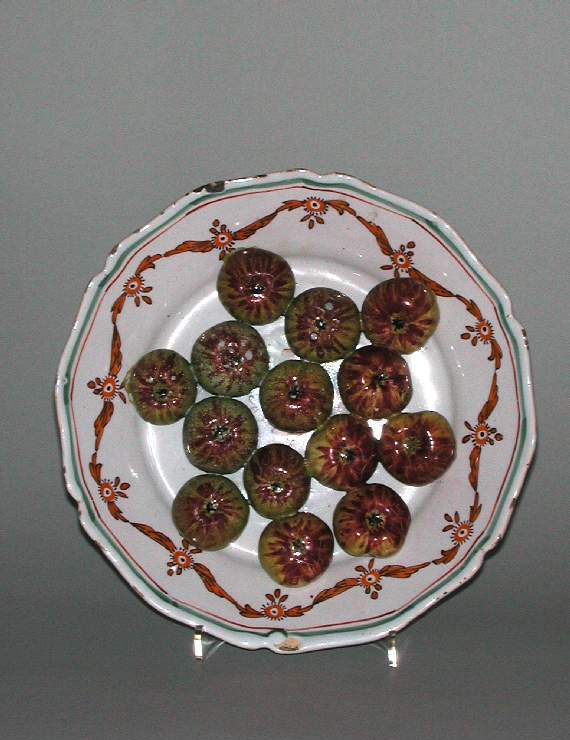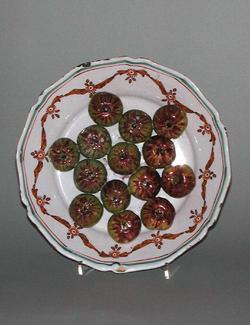Current Location: In storage
Maker(s)
Production:
Alcora factory
Entities
Categories
Description
Tin-glazed earthenware painted in green, greenish-yellow, pale orange, and dull pink, and dark brown. The plate has a a rim with six indentations in the edge, a deep, sloping rim, and flat centre on which are fourteen moulded and applied fruits. The plate has green and orange bands around the rim, below which is an orange garland outlined in brown, comprising circular stylized flowerheads with swags of fabric between them. The greenish-yellow fruit have dull pink streaks radiating from a brown spot at the top to about half-way down their sides. The glaze has 'crawled' in one place on the edge of the rim. There are three peg marks on the back of the rim.
Notes
History note: Puttick & Simpson, London, 6 March, 1903, Mr Lovett’s Collection; bought by Dr J.W.L. Glaisher, FRS, Trinity College, Cambridge. However, Rackham (1935), states that it came from the Riaqno Collection, bought in Eastbourne in 1904.
Legal notes
Dr J. W. L. Glaisher Bequest
Measurements and weight
Diameter: 23.5 cm
Height: 3.2 cm
Acquisition and important dates
Method of acquisition: Bequeathed
(1928-12-07)
by
Glaisher, J. W. L., Dr
Dating
18th Century, third quarter
18th Century, Late
Circa
1765
CE
-
1785
CE
Note
The Alcora factory was founded in 1727 by the 9th Duke of Aranda, Buenaventura Ximénez de Urrea, Abarca de Boléa. On his death in 1742 it was inherited by his son, Pedro Pablo.
School or Style
Rococo
Components of the work
Decoration
composed of
high-temperature colours
( green, greenish-yellow, orange, dull pink, and dark brown)
Fruit
Plate
Materials used in production
Tin-glaze
Earthenware
Techniques used in production
Tin-glazing
References and bibliographic entries
Related exhibitions
Identification numbers
Accession number: C.2138-1928
Primary reference Number: 76621
Old object number: 1433
Stable URI
Audit data
Created: Saturday 6 August 2011
Updated: Friday 1 August 2025
Last processed: Friday 1 August 2025
Associated departments & institutions
Owner or interested party:
The Fitzwilliam Museum
Associated department:
Applied Arts





